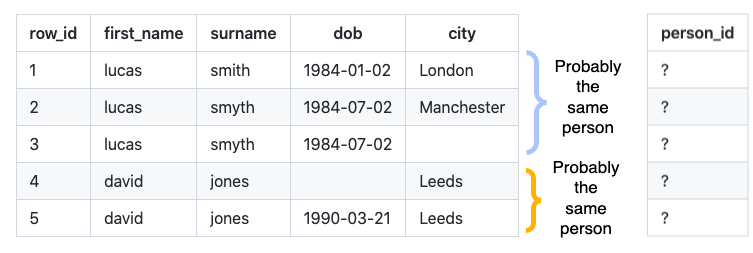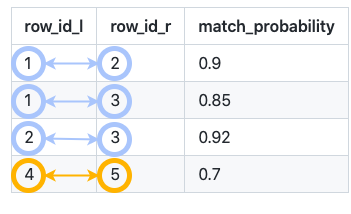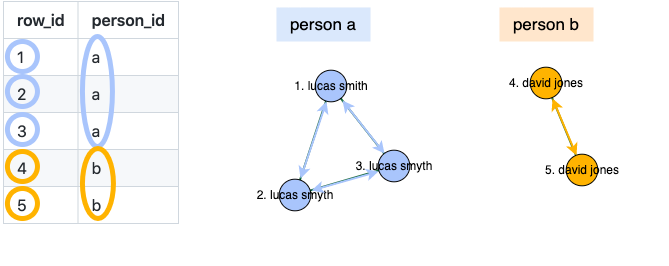
Security News
Fluent Assertions Faces Backlash After Abandoning Open Source Licensing
Fluent Assertions is facing backlash after dropping the Apache license for a commercial model, leaving users blindsided and questioning contributor rights.

[!IMPORTANT] 🎉 Splink 4 has been released! Examples of new syntax are here and a release announcement is here.
Splink is a Python package for probabilistic record linkage (entity resolution) that allows you to deduplicate and link records from datasets that lack unique identifiers.
It is used widely by within government, academia and the private sector - see use cases.
⚡ Speed: Capable of linking a million records on a laptop in around a minute.
🎯 Accuracy: Support for term frequency adjustments and user-defined fuzzy matching logic.
🌐 Scalability: Execute linkage in Python (using DuckDB) or big-data backends like AWS Athena or Spark for 100+ million records.
🎓 Unsupervised Learning: No training data is required for model training.
📊 Interactive Outputs: A suite of interactive visualisations help users understand their model and diagnose problems.
Splink's linkage algorithm is based on Fellegi-Sunter's model of record linkage, with various customisations to improve accuracy.
Consider the following records that lack a unique person identifier:

Splink predicts which rows link together:

and clusters these links to produce an estimated person ID:

Splink performs best with input data containing multiple columns that are not highly correlated. For instance, if the entity type is persons, you may have columns for full name, date of birth, and city. If the entity type is companies, you could have columns for name, turnover, sector, and telephone number.
High correlation occurs when one column is highly predictable from another - for instance, city can be predicted from postcode. Correlation is particularly problematic if all of your input columns are highly correlated.
Splink is not designed for linking a single column containing a 'bag of words'. For example, a table with a single 'company name' column, and no other details.
The homepage for the Splink documentation can be found here, including a tutorial and examples that can be run in the browser.
The specification of the Fellegi Sunter statistical model behind splink is similar as that used in the R fastLink package. Accompanying the fastLink package is an academic paper that describes this model. The Splink documentation site and a series of interactive articles also explores the theory behind Splink.
The Office for National Statistics have written a case study about using Splink to link 2021 Census data to itself.
Splink supports python 3.8+. To obtain the latest released version of splink you can install from PyPI using pip:
pip install splink
or, if you prefer, you can instead install splink using conda:
conda install -c conda-forge splink
For projects requiring specific backends, Splink offers optional installations for Spark, Athena, and PostgreSQL. These can be installed by appending the backend name in brackets to the pip install command:
pip install 'splink[{backend}]'
pip install 'splink[spark]'
pip install 'splink[athena]'
pip install 'splink[postgres]'
The following code demonstrates how to estimate the parameters of a deduplication model, use it to identify duplicate records, and then use clustering to generate an estimated unique person ID.
For more detailed tutorial, please see here.
import splink.comparison_library as cl
import splink.comparison_template_library as ctl
from splink import DuckDBAPI, Linker, SettingsCreator, block_on, splink_datasets
db_api = DuckDBAPI()
df = splink_datasets.fake_1000
settings = SettingsCreator(
link_type="dedupe_only",
comparisons=[
cl.JaroWinklerAtThresholds("first_name", [0.9, 0.7]),
cl.JaroAtThresholds("surname", [0.9, 0.7]),
ctl.DateComparison(
"dob",
input_is_string=True,
datetime_metrics=["year", "month"],
datetime_thresholds=[1, 1],
),
cl.ExactMatch("city").configure(term_frequency_adjustments=True),
ctl.EmailComparison("email"),
],
blocking_rules_to_generate_predictions=[
block_on("first_name"),
block_on("surname"),
]
)
linker = Linker(df, settings, db_api)
linker.training.estimate_probability_two_random_records_match(
[block_on("first_name", "surname")],
recall=0.7,
)
linker.training.estimate_u_using_random_sampling(max_pairs=1e6)
linker.training.estimate_parameters_using_expectation_maximisation(
block_on("first_name", "surname")
)
linker.training.estimate_parameters_using_expectation_maximisation(block_on("dob"))
pairwise_predictions = linker.inference.predict(threshold_match_weight=-10)
clusters = linker.clustering.cluster_pairwise_predictions_at_threshold(
pairwise_predictions, 0.95
)
df_clusters = clusters.as_pandas_dataframe(limit=5)
To find the best place to ask a question, report a bug or get general advice, please refer to our Guide.
🥈 Civil Service Awards 2023: Best Use of Data, Science, and Technology - Runner up
🥇 Analysis in Government Awards 2022: People's Choice Award - Winner
🥈 Analysis in Government Awards 2022: Innovative Methods - Runner up
🥇 Analysis in Government Awards 2020: Innovative Methods - Winner
🥇 MoJ Data and Analytical Services Directorate (DASD) Awards 2020: Innovation and Impact - Winner
If you use Splink in your research, please cite as follows:
@article{Linacre_Lindsay_Manassis_Slade_Hepworth_2022,
title = {Splink: Free software for probabilistic record linkage at scale.},
author = {Linacre, Robin and Lindsay, Sam and Manassis, Theodore and Slade, Zoe and Hepworth, Tom and Kennedy, Ross and Bond, Andrew},
year = 2022,
month = {Aug.},
journal = {International Journal of Population Data Science},
volume = 7,
number = 3,
doi = {10.23889/ijpds.v7i3.1794},
url = {https://ijpds.org/article/view/1794},
}
We are very grateful to ADR UK (Administrative Data Research UK) for providing the initial funding for this work as part of the Data First project.
We are extremely grateful to professors Katie Harron, James Doidge and Peter Christen for their expert advice and guidance in the development of Splink. We are also very grateful to colleagues at the UK's Office for National Statistics for their expert advice and peer review of this work. Any errors remain our own.
While Splink is a standalone package, there are a number of repositories in the Splink ecosystem:
FAQs
Fast probabilistic data linkage at scale
We found that splink demonstrated a healthy version release cadence and project activity because the last version was released less than a year ago. It has 4 open source maintainers collaborating on the project.
Did you know?

Socket for GitHub automatically highlights issues in each pull request and monitors the health of all your open source dependencies. Discover the contents of your packages and block harmful activity before you install or update your dependencies.

Security News
Fluent Assertions is facing backlash after dropping the Apache license for a commercial model, leaving users blindsided and questioning contributor rights.

Research
Security News
Socket researchers uncover the risks of a malicious Python package targeting Discord developers.

Security News
The UK is proposing a bold ban on ransomware payments by public entities to disrupt cybercrime, protect critical services, and lead global cybersecurity efforts.